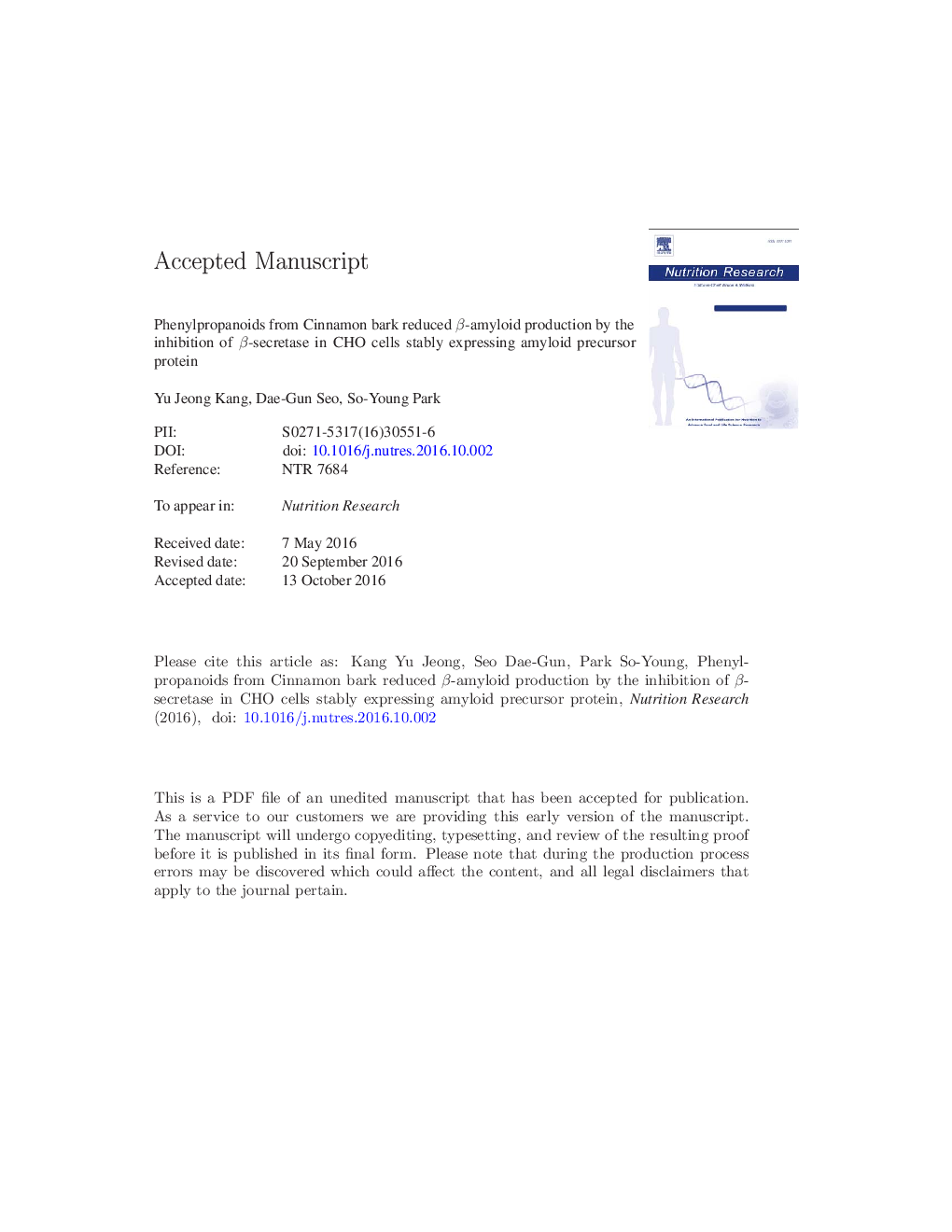| کد مقاله | کد نشریه | سال انتشار | مقاله انگلیسی | نسخه تمام متن |
|---|---|---|---|---|
| 5588656 | 1404565 | 2016 | 28 صفحه PDF | دانلود رایگان |
عنوان انگلیسی مقاله ISI
Phenylpropanoids from cinnamon bark reduced β-amyloid production by the inhibition of β-secretase in Chinese hamster ovarian cells stably expressing amyloid precursor protein
دانلود مقاله + سفارش ترجمه
دانلود مقاله ISI انگلیسی
رایگان برای ایرانیان
کلمات کلیدی
BuOHβ-secretaseEtOAcAPPACNnuclear magnetic resonance - رزونانس مغناطیسی هستهای3-(4,5-dimethylthiazol-2-yl)-2,5-diphenyl-tetrazolium bromide - 3- (4،5-dimethylthiazol-2-yl) -2،5-difenyl tetrazolium bromideAβ40 - A40Cinnamomum cassia - Cianamomum cassiaDMSO - DMSOMTT - MTTn-Hexane - n-hexaneβ-Amyloid - β-آمیلوئیدEthyl acetate - اتیل استاتAcetonitrile - استونیتریلCho - برایButanol - بوتانولAlzheimer disease - بیماری آلزایمرChinese Hamster Ovary - تخمدان هامستر چینیELISA - تست الیزاEnzyme-linked immunosorbent assay - تست الیزاNMR - تشدید مغناطیسی هستهای Dimethyl sulfoxide - دیمتیل سولفواکسیدMethanol - متانولMeOH - مونHex - هگزاamyloid precursor protein - پروتئین پیش ماده آمیلوئیhigh-performance liquid chromatography - کروماتوگرافی مایعی کاراHPLC - کروماتوگرافی مایعی کارا
موضوعات مرتبط
علوم زیستی و بیوفناوری
بیوشیمی، ژنتیک و زیست شناسی مولکولی
علوم غدد
پیش نمایش صفحه اول مقاله

چکیده انگلیسی
β-Amyloid (Aβ) is a substance of Alzheimer disease (AD), which is generated via the amyloidogenic pathway from amyloid precursor protein (APP) by β-secretase and γ-secretase. Inhibition of Aβ production is a potential therapeutic approach to AD. Thus, we tested the hypothesis that cinnamon bark (Cinnamomi Cortex Spissus), the dried bark of Cinnamomum cassia Blume (Lauraceae), and its constituents are beneficial to AD. The methanol extract of cinnamon bark efficiently reduced Aβ40 production in Chinese hamster ovarian (CHO) cells stably expressing APP as determined by enzyme-linked immunosorbent assay. Bioassay-guided isolation of cinnamon bark extract was carried out using open column chromatography and high-performance liquid chromatography, and the following 6 phenylpropanoids were isolated: syringaresinol (1); medioresinol (2); coumarin (3); 2-hydroxycinnamaldehyde (4); cryptamygin A (5); and 3â²,5,7-trimethoxy epicatechin (6). Among these, 4 μg/mL medioresinol and cryptamygin A reduced Aβ40 production by 50% and 60%, respectively, compared with dimethyl sulfoxide-treated control cells. The IC50 values of medioresinol and cryptamygin A for the inhibition of Aβ40 production were 10.8 and 8.2 μg/mL, respectively. Furthermore, treatment of APP-CHO cells with either compound decreased the amount of β-secretase and sAPPβ (the proteolytic fragment of APP catalyzed by β-secretase). These results suggest that the antiamyloidogenic activity of cinnamon bark extract was exerted by medioresinol and cryptamygin A via a reduction in the amount of β-secretase. The extract of cinnamon bark contains potentially valuable antiamyloidogenic agents for the prevention and treatment of AD.
ناشر
Database: Elsevier - ScienceDirect (ساینس دایرکت)
Journal: Nutrition Research - Volume 36, Issue 11, November 2016, Pages 1277-1284
Journal: Nutrition Research - Volume 36, Issue 11, November 2016, Pages 1277-1284
نویسندگان
Yu Jeong Kang, Dae-Gun Seo, So-Young Park,